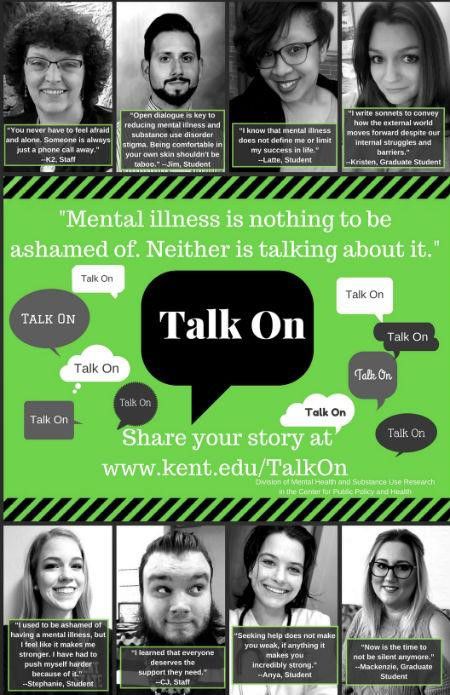Artists wanted: help stop mental health stigma
October 26, 2018
Kent State’s Center for Public Policy and Health and the School of Art are looking for artists to participate in the Create Awareness campaign.
The Create Awareness campaign started after the Talk On initiative began in spring 2018. The purpose of Talk On is to stop the stigma behind mental illness by having KSU students, faculty and staff share their personal experiences. These can be shared through stories, song lyrics, poetry, drawings and photos.
“Talk On is an important initiative because it provides people with a platform to share their personal experiences with mental illness,” said Kimberly Laurene, the project coordinator for AWARE Kent. “It lets others know they are not alone, shows that recovery is possible, and may encourage people to seek help.”
Create Awareness was created in order to further share these personal experiences through art forms. You can register to participate by going to the Talk On webpage and then click “Create Awareness Information/Registration.” Any KSU student, faculty or staff can register for Create Awareness. The artwork will be displayed outside of the SAS office in the library.
Once an artist registers, there will be a meeting to discuss which Talk On personal experience they would like to portray through their art, then they will be assigned to that submission. The accepted art mediums include drawing, painting, mixed media, collage, print media, photography, fiber and textile.
The Center for Public Policy and Health is also offering a number of mental health trainings; for instance, there is Kognito for students, which is a 30 minute online training simulation; Kognito for faculty and staff, which is a 45 minute training simulation; and there is QPR, which is a 60 minute online, self-guided course for KSU families. There is also an option for Mental Health First Aid, which is an 8 hour in-person course for students, faculty and staff.
One in five adults will experience a mental illness in a given year, therefore it is very common. It is important to understand the impact of mental health and to use all tools and recourses to help train people to recognize signs and symptoms.
If you have any questions or concerns you can reach Kimberly Laurene at [email protected] or Dr. Deric Kenne at dkenne @kent.edu.
Madeline Pigott is the Mental Health and Social Services reporter. Contact her at [email protected].












